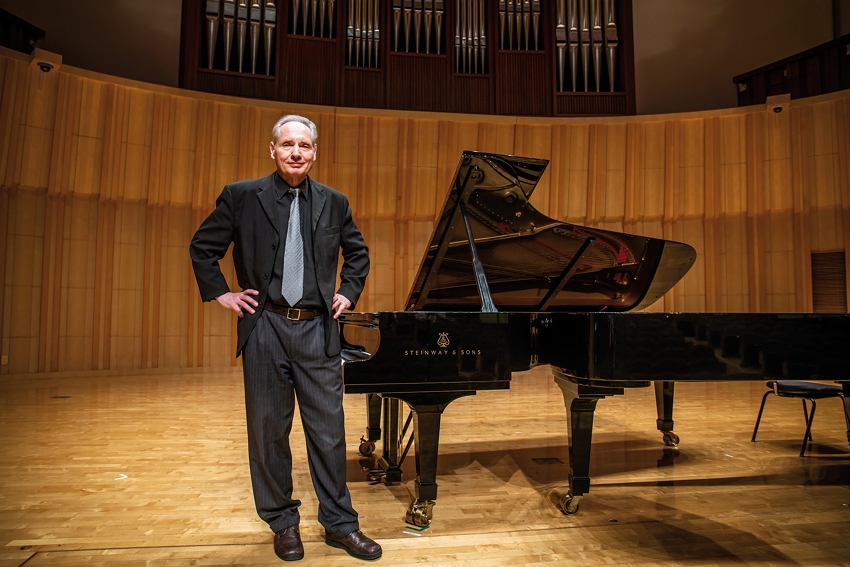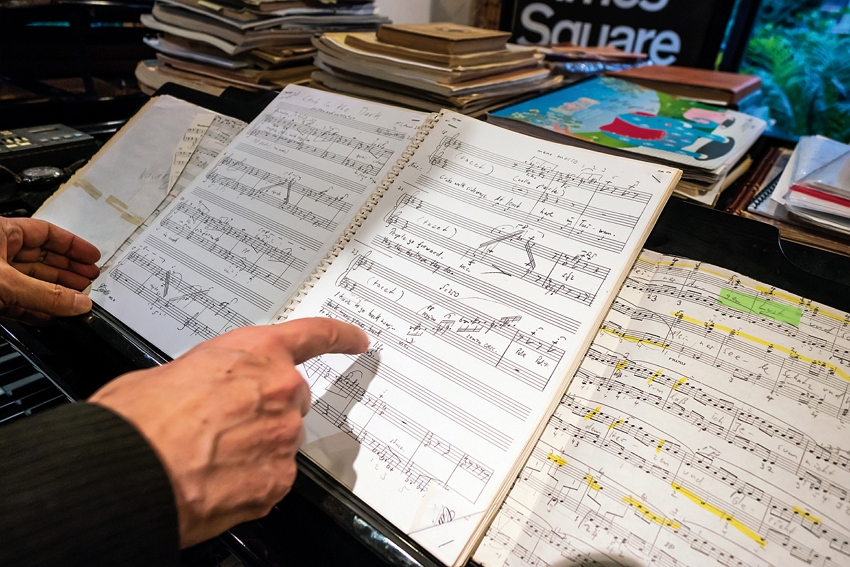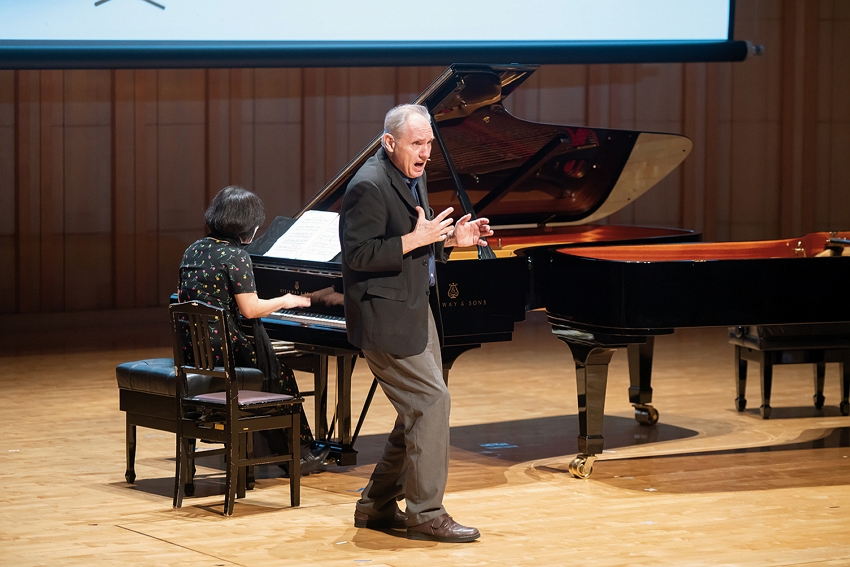New Southbound Policy Portal

Musician Rolf-Peter Wille (photo by Lin Min-hsuan)
“Certainly, as a foreign subject, I may not claim the longest residency in Taiwan, but 30 years—no parole—is not too bad. In comparison, Robinson Crusoe left his fictional island after only 28 years.”—Rolf-Peter Wille, Formosa in Fiction
In 1978 Rolf-Peter Wille, just turned 24 and recently graduated from the Hanover University of Music, Drama and Media, arrived in the distant and unfamiliar land of Taiwan with the same sense of adventure as Robinson Crusoe.
Was this because his Taiwanese wife insisted that they settle in Taiwan? Not at all. “At that time, it was he who wanted to come to have a look at Taiwan,” clarifies musician Lina Yeh, Wille’s partner, who was also his classmate.

Wille and his wife Lina Yeh attracted a great deal of attention when they performed exquisite piano duets in the streets of Taipei. (courtesy of Lina Yeh)
Although Taiwan’s musical environment cannot be compared to the vigorous and robust one of Europe, where classical music originated, because development in Europe started earlier than elsewhere, even 40 years ago the music market there was saturated, and it was not easy for graduates to get positions teaching in universities.
But back then, Taiwan was virgin soil for classical music. This gave musicians a great deal of freedom, and gave people reason to look forward to the future.
And so it was that the newlywed Rolf-Peter Wille traveled the great distance to Taiwan and began teaching in a university.
A German in TaiwanAs an outsider at first, there were naturally many surprises (or perhaps one should say things that were difficult to adapt to) for Wille in daily life in Taiwan. “However, I was still young then and I could put up with anything.” You can’t help but laugh when he says this.
The biggest difference was the strict understanding Germans have of space and of its clear boundaries. This not only applies to private space, but also to public space.
Lina Yeh, who understands well the great differences in the cultures of the two countries, explains: “For example, in German homes, everything has its designated place, and even children are not permitted to move things around as they please.” Taiwanese, who tend to be rather casual in this respect, find this very difficult to understand.

Rolf-Peter Wille has transformed his experience of life in Taiwan into touching melodies that transcend the language barrier and go directly to people’s hearts.
Because Wille’s profession is music education, often students come to his house to take piano lessons. Wille recalls that once a parent accompanied a student to a lesson. “The parent was continually saying, ‘Teacher, take it easy, take it easy,’ and then he went off and opened our refrigerator.” Says Wille, “If this happened in Germany, you could call the police.”
It is said that Germans, who have clear spatial logic, have to get to know the place where they live, including its coordinates, geography, hydrology, and roadways, beginning from their entry into primary school. It’s as if not knowing your own location in this vast world would make it impossible to settle down and get on with your life.
Wille brought this spirit into play in Taiwan. Starting off with the Da’an District of Taipei City, where he lives, he rode his bicycle through the streets and lanes, drew a map marking out the major roadways, and memorized it. “I discovered that Da’an District has a shape similar to Frederick II, the King of Prussia.” He shows us his hand-drawn map and at first glance there really is some resemblance.
Looking at Taiwan with humorLike many Germans, when Wille is not smiling the hard lines on his face make him look quite stern. But as he speaks, in his foreign-accented Chinese sprinkled with German and English, witticisms pour forth. It matches the humorous writing style of his book—the phrase “the style mirrors the writer” is right on the nose.
The large cultural gap has given rise to many comical experiences for Wille. In particular, the Chinese language, which is quite difficult for foreigners, often causes misunderstandings. Lina Yeh recalls: “Once we were talking with a friend who said that after marriage there are many areas that require compromise [tuoxie in Chinese]. Wille asked, ‘Why do you have to take your shoes off [also pronounced tuoxie] after getting married?’”
Because Wille meets the collisions between heterogeneous cultures with humor, one surprising event after another has played out in his life.
The couple both love antiques. Inside their home, there are so many old objects integrated into the living space that you can’t take them all in at first look. They have everything from an old temple door painted with door gods, beautifully crafted dougong (interlocking wooden brackets that link columns and crossbeams in traditional Chinese architecture), and miniature curio cabinets, to a large number of deity statues, puppets, and sculptures of animals. It has more of an atmosphere of antiquity than a typical traditional Taiwanese home.

Wille and Yeh perform a melodrama together, not only playing their instruments but also speaking the dialogue. The music is like a movie soundtrack, in a performance full of suspense.
However, the most numerous and eye-catching objects in his collection—the ones that make you laugh out loud—are his more than 30 urinal bottles, mostly antique ceramic ones.
As Wille gathers together the bottles, which are normally scattered about his home as decorative objects, to show them to us, he says: “The pattern on this one is very special.” He points to one with a delicate blue-green design on it and tells us it was the starting point for his unusual collection.
Yeh recalls the serendipitous origins of this collection: “This was not started on purpose. Once we were in Tainan and we met an antiques shop owner who kept pestering Rolf-Peter to buy something until he couldn’t stand it anymore. He pointed to some celadon porcelain, and asked whether the antiques dealer had a urinal bottle with the same design on it. Surprisingly enough he did, so we were left with little choice but to buy it!” Once word got out, some people donated bottles off their own bat, while others came forward to peddle some. Over decades his collection has grown, unplanned, to its now considerable size.
For the past 40 years, the joys and sorrows of life in a new land have percolated into Wille. But when asked if he has any regrets, he replies, deadpan as ever: “When I first got here, I didn’t think I would stay. Whenever anything ridiculous or funny happened, I would say to myself, ‘Wait until you get back to Germany, you can tell these stories to your friends.’” But now that his status in Taiwan has changed, he dramatically expresses regret: “Now I’ll never be able to do that!”
For now, both Taiwan and Germany are “home.”
A German immigrant sets down rootsIn October of 2016, the government of Taiwan finally changed the law to recognize dual citizenship, and many foreigners began actively trying to become citizens of Taiwan.
However, Wille, who originally thought to apply for naturalization under the category of “high-level professionals,” continually hesitated and delayed his application because of the rigorous language exam.
As he shows us a very thick book of sample questions, a book that he compiled himself, he says the path to naturalization is by no means easy. In general applicants must get a grade of 60 or higher to pass the language test.
However, the orderly and methodical Wille printed out the questions and one by one added the pronunciation in Romanization complete with tones, along with the answers. He even made a video for each of the questions, reading the question and his answer into the camera and accompanying his voice with exaggerated hand gestures and body movements in an effort to memorize the correct tones to use in pronouncing the words. “Perhaps my body would remember what my brain couldn’t,” he jokes.

Acquiring Taiwan citizenship gave Wille a genuine guarantee that he will be able to spend the rest of his life here, as he plans to do.
Fortunately they later discovered that because Wille and Lina had won a National Cultural Award for their expertise in piano duos, they could file Wille’s application under the category of “persons who have made special contributions to Taiwan.” This category does not require an exam, and after gathering all necessary documentation, in only ten days he received his ID card.
Because they have put on concerts together for many years, Wille and Yeh are especially well known among the public for their piano duo performances. This devoted couple first set a precedent by performing on the streets of Taipei, and later even had pianos transported onto Taiwan’s highest mountain, Yushan (Mt. Jade) to play, and onto Alishan (Mt. Ali) to perform in front of the “Tataka Couple Trees”—a pair of ancient trees beside Provincial Highway 21, called the “husband and wife trees” in Chinese.
They say that piano duos (two pianists playing separate pianos) are not very similar to piano duets (two pianists sharing one piano). For piano duets, given the limits of the single keyboard and the fact that the piano has only one set of pedals, inevitably each of the players must learn to accommodate the other. Piano duos, on the other hand, offer greater freedom and more opportunities to bring one’s skills into play.
Their lives and work are just like this unique performance form. Though they come from different backgrounds, with different customs and ways of life, these have not become limitations. Rather, because of their diversity, they have created a symphony of harmony and a unique lifestyle. “Compared to piano duets, piano duos are richer and more expressive.” These words of Lina Yeh seem to ring in one’s ears.